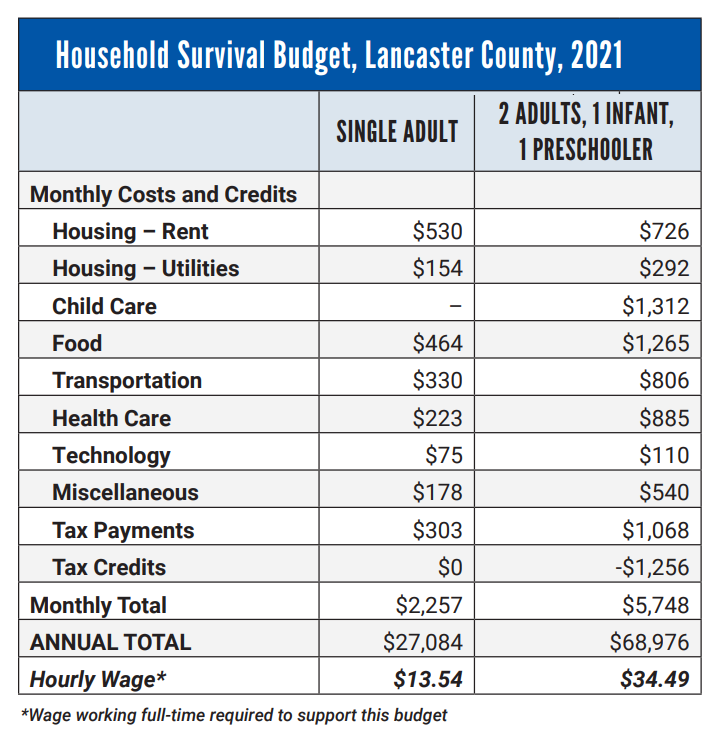
The number of Pennsylvanians who are struggling to make ends meet is on the increase in the wake of the pandemic, and the expiration of federal pandemic assistance raises concerns that their plight will worsen, according to a new report from United Way of Pennsylvania.
There are 1.4 million Pennsylvania working households that earn more than the federal poverty level “but still can’t afford a no-frills budget which represents the cost of living for household essentials,” said Kristen Rotz, the organization’s president.
United Way refers to households that remain economically precarious despite employment as ALICE households, which stands for “Asset Limited, Income Constrained, Employed.”
Tuesday marked the release of “ALICE in the Crosscurrents,” the 2023 ALICE report for Pennsylvania. It’s the first to incorporate post-pandemic data, compiled primarily from the U.S. Census and other federal sources. The data, from 2021, is the most recent available; Rotz unveiled the update at a media briefing at the Capitol in Harrisburg.
The pandemic “disrupted longstanding patterns” and its effects on society and public policy are still unfolding, the report says.
Its centerpiece is the “Household Survival Budget,” the amount families need to cover housing, food, transportation, healthcare and childcare if they have children.
For a family of four in Pennsylvania, the report puts the total is just over $80,000 a year, a number that drops to just under $65,000 once federal tax credits are factored in. By comparison, the federal poverty level for a family of four is $26,600.
Add the 636,000 Pennsylvania households in poverty to the state’s 1.4 million ALICE households, and a full 2 million households, or 39% of the state total, were falling short of economic security in 2021, the report says.
That percentage had begun to fall in 2019, but reversed course during the pandemic. As a result, it is essentially unchanged since 2018; the raw numbers underlying it are slightly larger, reflecting population growth.
For more information
For full ALICE data on Pennsylvania, other participating states and the U.S. as a whole, visit UnitedforALICE.org.
The report includes county-by-county breakdowns. For Lancaster County, the Household Survival Budget is $68,976, higher than the state average. The report categorizes 26% of Lancaster County as ALICE households and another 9% as in poverty, for a total of 35%, four percentage points below the state’s 39%.
While Whites account for 75% of the 2 million households below the ALICE threshold, Black and Hispanic households are more likely to be ALICE households.
In Lancaster County, 56% of Black and 53% of Latino households fell below the threshold, versus 33% of White households. (For more economic data broken down by race and ethnicity, see the Lancaster County Racial Equity Profile.)
Single-parent and elderly Pennsylvanians also are more likely to fall into the ALICE category, United Way of Pennsylvania said.
“Many ALICE Pennsylvanians are the essential workers who were the heroes among the disruption of the COVID-19 pandemic,” Rotz said. “They went to work and kept our communities functioning, while walking a financial tightrope.”
Households below the ALICE threshold are facing increased financial insecurity, food insecurity and higher rates of anxiety and depression, she said.
United Way of Pennsylvania has been calling on the state to enact a refundable earned income tax credit, or EITC, which would function like its federal counterpart. A state EITC equal to 25% of the federal one would benefit nearly 900,000 households, 12% of the total, providing $594 apiece on average, the nonprofit calculate.
The state United Way is also pushing for expanded state support for childcare, in order to raise industry wages and make care more affordable for working families.
“The strength of the Pennsylvania economy is inextricably tied to the financial stability of its residents. … Leaving ALICE behind in the recovery sets households and the larger economy up for greater vulnerability to the next economic disruption,” Rotz said.
(Editor’s Note: This article has been updated to clarify that the data and analysis are for 2021.)









